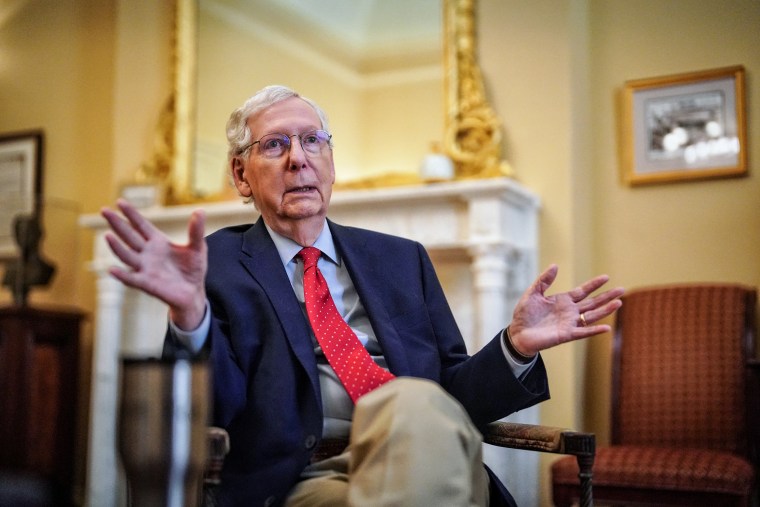WASHINGTON — For Senate Minority Leader Mitch McConnell, the monthslong fight over U.S. aid to Ukraine carried historical implications.
Last year, Ukrainian forces were successfully holding off Russian advances but were in desperate need of new weapons, ammunition and supplies. President Joe Biden sent an urgent request to Congress for a new round of aid to the war-torn country, and McConnell, R-Ky., immediately got on board.
But he faced a major obstacle: The loudest voices in his own party had suddenly developed a new opinion about whose side they were on.
“It was a family fight from the beginning,” McConnell said Wednesday in an interview. “This was a Republican issue; it was a family fight. And that’s where the action was on Ukraine, on our side.”
From McConnell's perspective, winning over the reluctant faction of the GOP is among one of the most significant legislative victories of a congressional career that has spanned decades.
“Well, I think certainly one of the most important issues I’ve been involved in over all these years,” McConnell said before pausing. “And if you look at it from a worldwide point of view you could argue that it is the most important.”
Throughout his career McConnell shepherded deregulation legislation and Republican tax cuts through the chamber, and last year he became the longest-serving leader of a party in Senate history.
McConnell also made one of the most consequential decisions of his career in 2016, when he decided to deny then-President Barack Obama’s Supreme Court nominee, Merrick Garland, a confirmation hearing or a vote. The decision resulted in Donald Trump’s drastically changing the makeup of the court when he won the presidency, by placing three conservative justices on the court who issued the decision to overturn Roe v Wade.
About Ukraine, a U.S ally, McConnell firmly believes that the GOP base was swayed by the message of then-Fox News host Tucker Carlson, who opposed U.S. support for it.
“He had an enormous audience among rank-and-file Republicans and began to demonize Ukraine in ways that I felt just completely ignored the facts,” McConnell said. “But he had a big following. And we’re all in politics, I mean, so people begin to hear from their own Republican friends and supporters about this.”
McConnell also said Trump contributed to the harsh criticism of Ukraine. The combination of the two most popular voices among GOP voters disparaging Ukraine led congressional Republicans to follow suit, which forced pro-Ukraine Republicans to add a border package to the negotiations, a package they thought had bipartisan support to make it to Biden's desk.
They were wrong.
“The former president said he would prefer that we not do anything at all,” McConnell recalled about the border provisions. “So that took several months.”
McConnell viewed the unfolding debate in the context of the lead-up to World War II. He said it worried him that the same isolationist tendencies that kept America on the sidelines until the attack on Pearl Harbor, Hawaii, were creeping in again at a time he viewed as potentially more dangerous.
Asked to compare the threats of 1941 to those of 2024, he said: “We had two big power competitors but not any developed terrorism problems. Now we have two big power competitors, and then we have Iran and terrorism. So this is a tougher situation than we faced then. I don’t want to make the same mistakes that we made then.”
The Senate originally considered an aid bill for Ukraine and Israel in February. The vote came on the heels of the failure of a bipartisan push for legislation to address the U.S. border with Mexico, with many Republicans joining Trump in saying they should not pass aid for abroad without addressing domestic threats.
But McConnell said that with that debate behind them, he saw support for the Ukraine package grow within his party.
“Once it was clear we were not going to get anywhere on the border, that issue fell away, and we were able to focus on what the package basically was,” McConnell said.
McConnell, who announced in February that he'll step down from the top post at the end of the year while remaining in Congress, concedes that Trump could have stood in the way and made the final steps in this process more difficult but chose not to, which made a big difference.
“I thought, at the end, he was helpful,” McConnell said of Trump, who secured his endorsement last month.
Trump has proven mercurial in his policy positions, moving on issues from day to day, but McConnell hopes for a long-term shift toward supporting Ukraine.
“I think that the fact that President Trump embraced [House Speaker Mike Johnson] was helpful. And he’s always impressed by winning, and I think we won by a big margin here in the Senate,” McConnell said of Tuesday's 79-18 vote.


